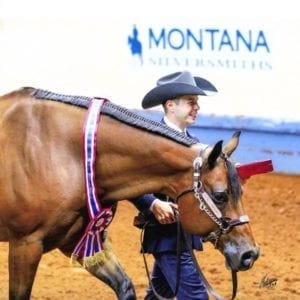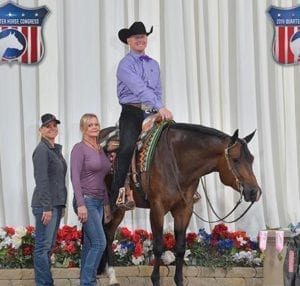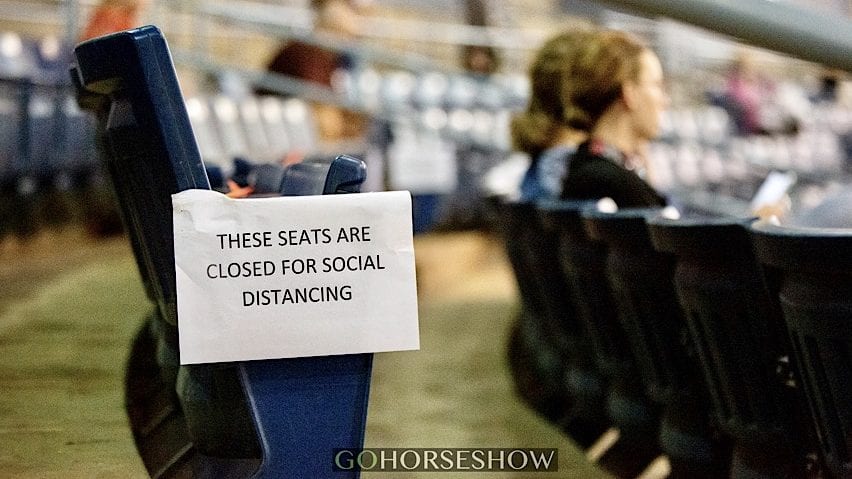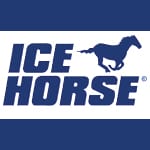COVID-19 has completely flipped the world upside down and the horse show world is no exception. Due to the virus, a large number of shows were forced to be canceled or postponed, while exhibitors sought virtual formats to get their showing fix. While this is an exciting and helpful way to grow as a rider, it is just not the same as in-person events.
As things start to loosen, however, a few shows have recently been held, like the Redbud Spectacular in Oklahoma City, which made it abundantly clear that this pandemic has changed our perception of what is “normal.” The show implemented social distancing guidelines and a cleaning crew was on hand to continually sanitize and clean the facility, helping to protect the safety of participants.
But as we all try to navigate the new normal, what measures taken at a show are enough? What is too much? We talked to exhibitors, trainers, and show managers about their thoughts on how horse shows should be run in this difficult time.
Follow the Guidelines
For shows to start up again, specific guidelines will be set in place by the government in each state. Some states are not sure when showing will start, but the overarching rules will have to be followed for events to take place. The rules may differ between the states and venues but will need to be respected.
 Multiple AQHA World Champion Amateur Exhibitor, Tony Anderman comments, “I think horse shows need to institute whatever guidelines the facilities, cities, and states mandate that allow shows to happen. The more accommodating we can be to outside regulations, the faster we can get back to doing what we love.”
Multiple AQHA World Champion Amateur Exhibitor, Tony Anderman comments, “I think horse shows need to institute whatever guidelines the facilities, cities, and states mandate that allow shows to happen. The more accommodating we can be to outside regulations, the faster we can get back to doing what we love.”
The more that people in the equine industry can follow the guidelines at events, the more shows can be held. Post-quarantine showing will form a new “normal” over time and respecting the rules at each venue is of utmost importance.
AQHA Judge and horse show manager, Chris Jeter adds, “It’s important to make all the exhibitors and staff feel comfortable. Arena setups and warm-up areas need to be configured to adjust for social distancing.”
Office Operations
 Show offices are the heart of horse shows. They process entries, make sure the event runs smoothly, the list goes on and on. These environments can be very crowded and involve increased contact between individuals. Offices at shows will most likely have to alter normal operations post-quarantine.
Show offices are the heart of horse shows. They process entries, make sure the event runs smoothly, the list goes on and on. These environments can be very crowded and involve increased contact between individuals. Offices at shows will most likely have to alter normal operations post-quarantine.
Horse show manager, Carmen Lay says, “In my opinion, the only place that would need to be different is in the office. More online entries and payment through PayPal or something similar. I think we should be respectful of those that want to distance themselves from shows. If you are sick, please stay home.”
 Eric John Felt of Eric Felt Show Horses, echoes Lay’s sentiments, “I expect to see more social distancing to an extent. Fewer people allowed in an office at one time, more online entries and credit card payments, and less interaction with outside spectators.”
Eric John Felt of Eric Felt Show Horses, echoes Lay’s sentiments, “I expect to see more social distancing to an extent. Fewer people allowed in an office at one time, more online entries and credit card payments, and less interaction with outside spectators.”
Social distancing precautions will likely be the most evident in the office settings where the congestion is higher.
Limit Attendees
One major prediction from exhibitors, trainers, and show managers alike is that the number of attendees at each event will be limited. Though it is unsure what specific restrictions will be set in place, this is something to be expected.
Anderman adds, “Horse shows may have to limit the number of spectators and the number of people in common areas. They may also have to hold off on exhibitor parties and events that put people near one another.”
Restricting the number of spectators at an event will likely be part of the horse show world post-quarantine. Exhibitor parties and gatherings may also not bounce back as quickly as all would like. Sacrifices will have to be made for things to start reaching a new normal.
Adapt and Stay Open-Minded
 Arguably, the most essential aspect of horse shows post-quarantine is the ability to adapt. Exhibitors, show managers, and trainers will all have to adjust their activities when needed. Anderman comments, “I think we have to be flexible and remember that it may take years to return to the old normal.”
Arguably, the most essential aspect of horse shows post-quarantine is the ability to adapt. Exhibitors, show managers, and trainers will all have to adjust their activities when needed. Anderman comments, “I think we have to be flexible and remember that it may take years to return to the old normal.”
Rolling with the punches will help the equine industry not only survive the pandemic but also find new ways to thrive. It will take time to adjust to the new normal, and staying open-minded is an essential component.
Jeter perfectly summarizes, “Everyone needs to respect everyone at the show. There will be vastly varying opinions about the entire situation. Every person’s opinion is valid, but we need to keep everyone comfortable with how they have chosen to respond. It’s more important than ever to be friendly and helpful.”








